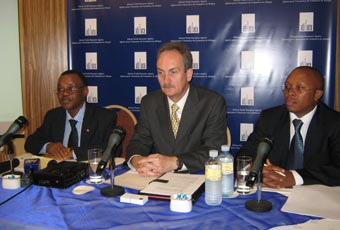
By Patrick Kagenda
A new insurance company offering rare insurance services has entered the Uganda market. Africa Trade Insurance (ATI) is a multilateral political and credit risk insurer that recently opened shop in Uganda. But its major challenge is to sell itself to the local insurance firms as most of them seem ignorant of it.
Stephen Musimbi, the General Manager of Paramount Insurance Company, said: “We know nothing about Africa Trade Insurance and we are waiting for the insurance association to brief us about it.”
Bernard Obel, the Assistant Commissioner for Finance and Investment at Uganda Insurance Commission, said: “ATI is not under our purview. They have a special position with Uganda Investment Authority.”
The ATI is bringing two new products on the Ugandan market; political risk insurance and trade credit risk insurance which had never existed before. Political risk will include offering cover against political violence, sabotage and terrorism while credit risk insurance will cover loss of exports, imports and domestic sales.
Africa Trade Insurance was established by African member states with financial and technical support from the World Bank and aims at filling a market gap in the African region. The World Bank is the major provider of financial support to allow African countries fund their equity contributions in Africa Trade Insurance. Launching ATI Uganda, the Managing Director Peter Jones said the insurance will reduce risk through diversification by bringing countries together. Its creation is a brainchild of the Common Market for Eastern and Southern Africa (Comesa) initiative and its current members are: Uganda, Burundi, Djibouti, DR Congo, Eritrea, Kenya, Madagascar, Malawi, Rwanda, Sudan, Tanzania, and Zambia. The ATI will partner with local insurance firms and reinsure them when they offer the political risk and credit risk insurance services.
But how will such a scheme operate in Uganda where insurance is not highly trusted. Which of the local firms is willing to offer political insurance and at what cost? These are some of the questions that ATI will have to address before it re-insures the local firms.
Solomon Rubondo the chairman of Uganda Insurers Association (UIA) told the independent that the coming of ATI to Uganda is to give cover to commercial and political risks, an area local firms have not been covering. They are here to supplement our work.
On the negative perceptions people have over the insurance firms, Rubondo said such negative attitudes are as old as the history of insurance itself.
“In spite of this negativity the industry is growing and we shall move with the people who understand and want the policies,” he said.
ATI’s main objective is to reduce the “cost of doing business’ in Africa by use of underwriting capital, reduced overhead costs, regional integration through international cooperation and risk sharing, enhanced possibilities for risk diversification by creating a regional risk portfolio and encouraging private sector insurers to assume risk in Africa.
While the ATI is focusing on expanding its membership (in Eastern, Southern, Central and Western Africa), its first challenge could be the already existing disagreement between Tanzania and the other East African member states over the common market protocol. With Tanzania challenging the issue of residence and travel documents in the East African common market area, ATI could find it hard fitting in such an environment.
ATI additional offices are expected to open in DR Congo, Rwanda and Zambia within a year. ATI plans to underwrite over US$1 billion worth of policies every year in Africa. Among its political risk insurance services include short, medium and long term foreign direct investment including intra-regional investment and comprehensive nonpayment cover for sovereign and sub-sovereign obligors. Under the trade credit risk insurance, services will include international and intra-regional whole turnover trade credit, non-payment cover of a year, medium and long term buyer credit insurance, exports, imports and domestic sales. The main terms of the products are a maximum tenor of 10 years, no minimum transaction size and a maximum line size (net exposure).
The political risk will carry a maximum line size of US$7.5 million while the credit risk will carry a maximum line of US$3.75 million. The insurance will offer an indemnity of up to 100% for the political risks and up to 85% of the commercial risks.
 The Independent Uganda: You get the Truth we Pay the Price
The Independent Uganda: You get the Truth we Pay the Price


